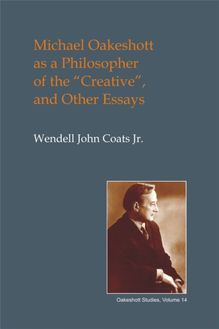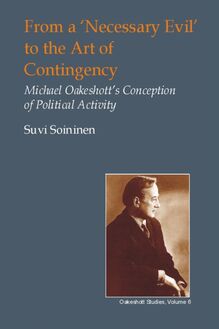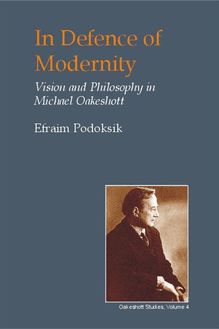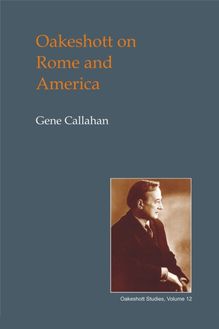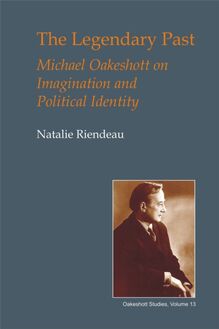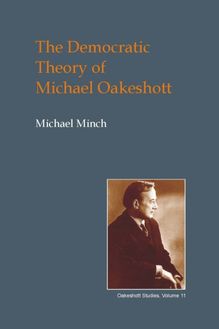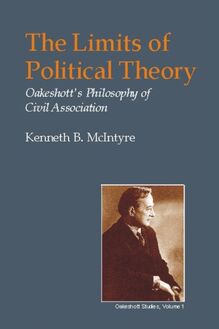Democratic Theory of Michael Oakeshott , livre ebook
161
pages
English
Ebooks
2015
Vous pourrez modifier la taille du texte de cet ouvrage
Obtenez un accès à la bibliothèque pour le consulter en ligne En savoir plus
Découvre YouScribe en t'inscrivant gratuitement
Découvre YouScribe en t'inscrivant gratuitement
161
pages
English
Ebooks
2015
Vous pourrez modifier la taille du texte de cet ouvrage
Obtenez un accès à la bibliothèque pour le consulter en ligne En savoir plus
Publié par
Date de parution
15 octobre 2015
Nombre de lectures
2
EAN13
9781845403881
Langue
English
Publié par
Date de parution
15 octobre 2015
Nombre de lectures
2
EAN13
9781845403881
Langue
English
Title Page
THE DEMOCRATIC THEORY OF MICHAEL OAKESHOTT
Discourse, Contingency, and ‘The Politics of Conversation’
Michael Minch
Copyright Page
Copyright © Michael Minch, 2009
The moral rights of the author have been asserted.
No part of this publication may be reproduced in any form without permission, except for the quotation of brief passages in criticism and discussion.
Originally published in the UK by Imprint Academic
PO Box 200, Exeter EX5 5YX, UK
Originally published in the USA by Imprint Academic
Philosophy Documentation Center
PO Box 7147, Charlottesville, VA 22906-7147, USA
Digital version converted and published in 2012 by
Andrews UK Limited
www.andrewsuk.com
imprint-academic.com/idealists
Acknowledgments
The following persons have given me immeasurable support and assistance. These contributions were, in nearly all cases, moral and emotional in nature, rather than intellectual in kind. For this reason, it was all the more important. My gratitude, then, must be expressed here to Danna Burns Minch, Peter Diamond, Tom McClenahan, Clifton Sanders, Suzanne Bratcher, Cindy and Scott Smith, Scott Abbott, Brian Birch, Chris Weigel, Laurie Whitt, Chandran Kukathas, and Noël O’Sullivan. Special thanks to Ben Rankin for proofreading this book, and preparing its Index. His help in this regard was incalculable. Thanks also to Cathryn Thayne for help with the bibliography. Of course, all errors in this book are mine alone.
I dedicate this book to my children, Bethany Marie and Dane Michael. May they come to know a more democratic future, and therefore, a more just and peaceable world.
1: Introduction
This book offers a description, explanation, and evaluation of Michael Oakeshott’s democratic theory. He was not a democratic theorist as such, but as a twentieth-century English political theorist for whom liberal theory held deep importance, his thought often engaged democratic theory implicitly, and many times did so explicitly. Fortuitously, my project penetrates two renewals. The first is the revitalization of interest in Oakeshott, and the second is the renewal of democratic theory which began in the 1980s. In respect to this latter renewal, I will engage the deliberative turn in democratic theory. These revivals create the context for this new look at Oakeshott. To state the matter as a problem, one might say that in light of new and fecund democratic theory, it is a problem for political theory if one of the most important political theorists of the twentieth century is left out of the discourse insofar as he has something relevant to say about deliberative democracy. It is of no small importance that almost all the work in democratic theory being done these days is of the deliberative/discursive kind, or responses to it. That is, deliberative theory is driving the agenda of democratic theory. I argue that Oakeshott does indeed have something relevant to say which is applicable to this democratic theory.
I will say some new things about Oakeshott, but not, in a direct way, too much about democratic theory. It is the argument I will put forward about conceptual relationships between his thought and deliberative democracy which will provide new ways of understanding him. I will not be making new claims about deliberative theory; this project’s purpose will be to see new things about Oakeshott as he is understood in respect to such theory. My argument will be that his theory of “civil association”, in particular, found in On Human Conduct , but not unrelated to his other texts, finds certain compatibilities with the deliberative turn. Insofar as this is the case, reading him in this way brings his thought to new light. It makes some contribution to how he can be understood. Although I will consider Oakeshott’s political theory up to On Human Conduct in respect to how it sheds light on his understanding and evaluation of democracy, it is his theorization of civil association in and the argument of On Human Conduct which will be of most interest.
His work before On Human Conduct makes some reference to democracy. In “The Masses in Representative Democracy”, he is critical of “popular government” because he sees it as fitting “mass man”. 1 “Popular government” in this essay looks much like rationalism in, for example, “Rationalism in Politics”, 2 and what becomes “enterprise association” and universitas in On Human Conduct , because it is defined by the substantive engagements and interests it promotes. 3 Unsurprisingly, Oakeshott understands democracy proper as parliamentary or representative democracy, and sees it as a superlative expression of the individuality that is so important to the liberal tradition, both morally and politically. He writes approvingly of democracy as the disappearing of the ruling class, 4 he thinks that “education must serve democracy”, 5 and he notes that if “the English manner of politics is to be planted elsewhere in the world, it is perhaps appropriate that it should first be abridged into something called ‘democracy’ ... ”. 6 In some of his earliest essays he argues that democratic theory stands in contrast to rationalism and is, rather, based on skepticism. 7 In “The Rule of Law”, published late in his career, he writes that what the rule of law “requires for determining the jus of a law is nota set of abstract criteria but an appropriately argumentative form of discourse in which to deliberate the matter; that is, a form of moral discourse ... ”. 8 The fullest theorization of democracy comes, however, I argue, in On Human Conduct .
Oakeshott’s civil association is a nonfoundational, noninstrumental, nonpurposive, and radically contingent association, and therefore, as such, its content is not predetermined by its members: this is to say, that although a political association has “content”, for example, rules or laws, incentives and disincentives, and purposes of various kinds (e.g., public safety); that content need not be of any particular kind in Oakeshott’s civil association. It is entirely up to the association’s members to determine the content of their association. If civil association is as nonpurposive and contingent as I will argue Oakeshott theorizes it, then such an association leaves an open space for deliberative politics. Further, I will argue that because Oakeshott so highly valued individuality, freedom, “self-enactment”, and concomitantly, was deeply concerned about forces and structures (especially the state) that infringed such individuality, freedom, and self-enactment; deliberative democracy is not only compatible with civil association, but that civil association, at least in some respects, is democracy that needs and promotes discourse. That is, deliberative democracy and civil association have theoretical congruous interconnections and overlaps. Oakeshott specifies a number of “postulates” which constitute human conduct, which, in turn, constitutes the basis for the civil condition and civil association. One of the postulates he theorizes is, in fact, deliberation. 9 About the civil condition he theorizes as normative and the politics it sustains, he writes,
As a deliberative and an argumentative engagement directed to reaching conclusions sustained by reasons designed to persuade others of their cogency, politics is identifiable not in terms of persons, places, or occasions, but only in respect of a focus of attention and a subject of discourse. The conditions of respublica ... may allow for the election or appointment of certain persons to devote themselves to political deliberation and negotiation ... [but] there is nothing in the engagement itself to suggest a profession and much to eloquently deny it ... . Political deliberation is, of course, conditional upon the postulates of human conduct and of moral and civil association ... . 10
Although I will interrogate Oakeshott rather thoroughly in respect to his career-long political theory, I can only use the work of representative figures to define deliberative democratic theory. The literature is far too substantial to do otherwise. I will consider the work of John Rawls, Jürgen Habermas, John Dryzek, and Amy Gutmann and Dennis Thompson for this purpose. Gutmann and Thompson have coauthored their important work on deliberative democracy, so they will naturally be treated as one source. Between these four perspectives, I will engage much of the most important work in deliberative theory.
This book contributes to Oakeshott studies in that it considers his work in a new light and adds to our understanding of his political theory, and his theories of political activity, morality, and mostly, civil association. Of course, for those interested in deliberative democracy, new considerations of Oakeshott’s civil association may shed light into that literature too, especially in respect to his treatment of moral practice. Again however, this book is meant to offer insight into Oakeshott, and the modest contribution to democratic theory will be secondary and derivative of the effort to see Oakeshott in a new way. This project thus follows well-worn paths insofar as work which warrants consideration over time is routinely scrutinized from various angles and perspectives, so that new conceptual connections can be made, new directions for further exploration suggested, new questions raised, and perhaps, even, old or new questions answered. 11
Oakeshott is interested, most fundamentally in the problematic of human conduct. His exploration of this matter leads him quickly and directly to the perennial question of how human beings conduct themselves in respect to one

